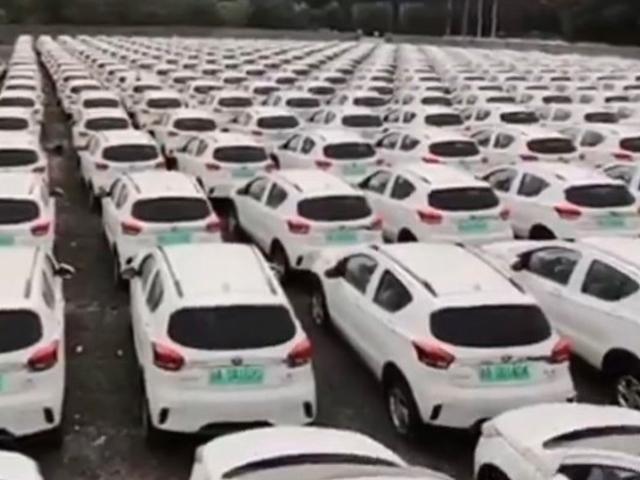In a striking development that underscores the volatility of global trade, Israel is bracing for an unprecedented influx of over 50,000 new cars, most of them Chinese-made, by the end of the year. This surge is primarily driven by an impending increase in purchase tax on electric vehicles slated for early 2025, but it also reflects broader geopolitical tensions, with a burgeoning trade war aimed at curbing the dominance of Chinese exports playing a pivotal role.
Global Trade Wars: The Storm is Brewing
The global automotive industry is at a critical juncture. In 2023, China exported a staggering 5 million vehicles worldwide, catching Western economies off-guard and igniting a fierce trade war. The response was swift: the European Union, first to act, imposed a "temporary duty" ranging from 20% to 38% on Chinese electric vehicles, citing anti-competitive practices by the Chinese government. As this protectionist stance gains traction, Chinese automakers find themselves cornered, with limited markets willing to absorb their massive production surpluses.
2/6
— Michael Pettis (@michaelxpettis) September 11, 2024
Once the US decides it no longer wants to play the role of accommodating the huge demand deficiencies and expanding manufacturing sectors of China and other surplus countries, it’s obvious that the rest of the world cannot replace the US.
The fallout has been dramatic. Prices for Chinese-made electric vehicles in Europe have surged by thousands of euros, importers are collapsing under financial strain, and vehicle stocks are piling up at ports in Europe and China. In a bid to sidestep these barriers, some Chinese manufacturers proposed establishing production facilities in Europe. However, this idea was swiftly rebuffed by Chinese authorities over concerns about technology leaks, prompting a stern warning from the European Union against any customs evasion attempts.
Meanwhile, in Russia, where Chinese vehicles dominate the market, a tightening grip on foreign currency transactions has begun to stifle imports. Across the Atlantic, the U.S. and Canada are preparing to escalate tariffs on Chinese electric vehicles and battery materials, with proposed increases from 25% to a staggering 100%. As global markets tighten their defenses, Israel has emerged as a critical outlet for China’s automotive exports, presenting a unique confluence of factors that make it a prime target for this vehicular deluge.
Israel: The Unlikely Battleground
Amidst this global turmoil, Israel stands out as a prime destination for Chinese automotive exports. With an annual vehicle market averaging 270,000 units, Israel may seem modest in size, but it offers distinct advantages for Chinese manufacturers. Lacking a domestic vehicle production industry, Israel imposes no protective tariffs on imports. Moreover, Israeli consumers, known for their acute sensitivity to value-for-money propositions, are increasingly favoring Chinese vehicles that offer competitive pricing and attractive features.
China's overcapacity is not only in EVs. Often seen as a weapon, it may reflect a domestic issue. Thai tile makers are being priced out of the Thai market by Chinese Thai-style tile makers. A strategy for Chinese policy? It's more likely Chinese consumers are not spending enough. pic.twitter.com/mJxCwrR4vs
— SIGNAL Group (@SinoIsrael) September 2, 2024
The result? A market ripe for disruption, where Chinese brands, some previously unknown, are making substantial inroads. Chinese vehicles have already captured over 22% of the Israeli market in 2024, a figure that is set to grow as more models and brands flood the market. This influx is not merely driven by consumer demand but is also fueled by the aggressive strategies of Israeli importers, eager to capitalize on lucrative import franchises and willing to commit to large pre-purchase orders.
A Market in Flux: The Changing Landscape of Israeli Automotive
The repercussions of this automotive influx are already palpable. Chinese manufacturers are exerting intense pressure on their Israeli partners to ramp up imports, often at discounted rates contingent on large volume commitments. This strategy is underscored by the sheer number of vehicle transport ships en route from China and Europe, with at least seven ships, each carrying between 2,500 to 5,000 vehicles, expected to dock in Israel in the coming weeks. Some of these ships will even make multiple trips before the year's end, highlighting the urgency with which Chinese automakers are offloading their stockpiles.
Adding to the competitive landscape is the willingness of Chinese brands to appoint multiple official importers in Israel if current partners cannot meet their sales targets. This unprecedented move has already seen the addition of new importers for established brands such as Maxus and JAC, with more manufacturers reportedly in negotiations to follow suit.
Chinese auto giant BYD has sold the highest number of electric cars in Israel from January to August, totaling 12,890 units, according to figures released by the Israel Vehicle Importers Association. pic.twitter.com/kpLWsiNB2m
— Chan Joe (@ChanJoe18) September 8, 2024
The Road Ahead: A Prelude to 2025
The current wave of Chinese vehicles flooding the Israeli market could be just the beginning. With stocks piling up and Western markets closing their doors, Israel's automotive landscape is on the cusp of a significant transformation. As Chinese brands continue to solidify their presence, Israeli consumers can expect an ever-widening array of vehicle options, increased competition, and potentially lower prices. Yet, this shift also raises questions about the long-term implications for Israel’s market dynamics and the resilience of local importers amidst such an aggressive expansion.
As 2025 approaches, the automotive arms race shows no signs of slowing down. For Israel, this influx represents both an opportunity and a challenge, as it navigates the complex interplay of global trade politics and local consumer preferences. Only time will tell if the current flood of Chinese vehicles is a temporary surge or the beginning of a new era in Israel’s automotive market.


